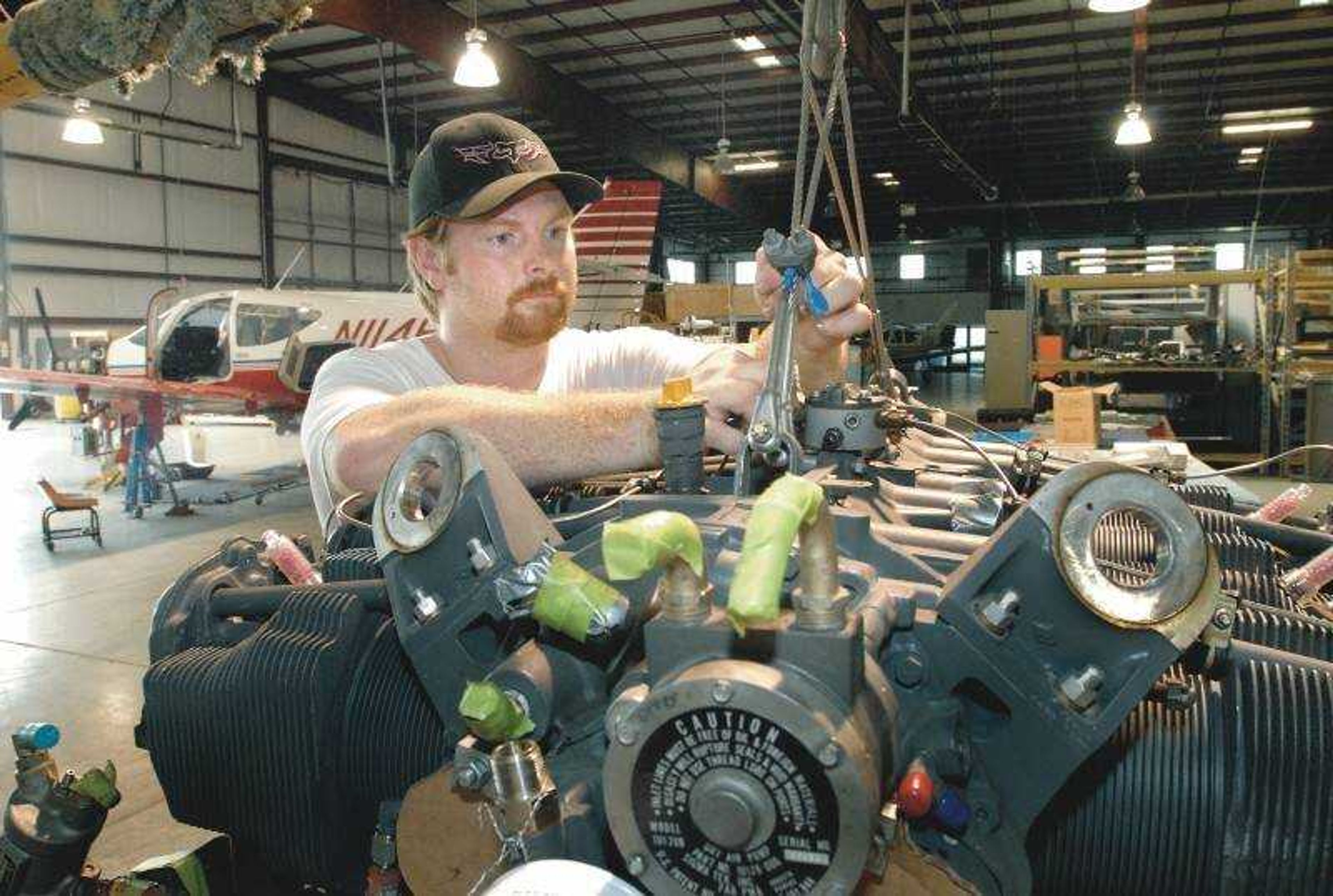Getting off the ground: Commander takes next step toward making airplanes
More than 10 months after relocating to Cape Girardeau, Commander Premier Aircraft Corp. has yet to build a single new airplane. But company executives say this isn't shades of Renaissance Aircraft, the company that previously occupied the same space at Cape Girardeau Regional Airport for three years before shutting up shop after failing to find funding...
More than 10 months after relocating to Cape Girardeau, Commander Premier Aircraft Corp. has yet to build a single new airplane.
But company executives say this isn't shades of Renaissance Aircraft, the company that previously occupied the same space at Cape Girardeau Regional Airport for three years before shutting up shop after failing to find funding.
"We are not building new airplanes yet. But all of this is leading up to that moment," said Carl Gull, vice president of operations.
The company is taking the appropriate steps -- which are many when the Federal Aviation Administration is involved -- to get off the ground, Gull said.
The most recent development came last week, when Commander officials announced it had opened its factory parts department and is accepting requests for parts for all models of single-engine Commander aircraft.
This is the second operation established at its new facilities to support the existing Commander fleet, which at one point topped out at 13,000 planes.
Company president Joel M. Hartstone said the company is now able to supply many of the parts that have been unavailable to Commander owners shut down its parts operation about two years ago. That happened when the new aviation firm purchased the assets of defunct Commander Aircraft Co., which had filed for bankruptcy. The company had been located in Oklahoma City.
Commander could not sell parts last winter right after it finished moving the inventory to Cape Girardeau, Hartstone said, because the company had to set up its parts operation in accordance with an FAA-approved "quality assurance program" first.
That program required Commander to reinspect each part for conformity to the design data for that part before it could be processed for shipping, Hartstone said. Each part must then be presented, with supporting paperwork, to the FAA for a second inspection and a written sign-off before it could shipped for installation in an aircraft.
The company also had to do a complete physical inventory count, establish a new inventory management and control system, set up a new warehouse and set up parts sales and shipping operations to actually process orders.
Currently, Commander can sell parts from its existing inventory and will be able to sell shipped-in parts as soon as next month, Gull said, after another FAA inspection. They are in the process of replenishing the parts inventory from some 400 suppliers across the Midwest.
The service center opened in February, Gull said, which works in much the same manner as an auto service center.
"When you buy a new car, you can take it back and have it serviced," he said. "The best experts on this plane are right here in the factory. So we're offering that opportunity for our customers."
There are eight employees at the facility, Gull said, including mechanics, a person in charge of purchasing and inventory, a parts sales supervisor, operations director and a shipping and receiving parts expediter.
All of these steps will culminate with the manufacturing of Commander's high-priced, single-engine planes, which company officials call the Mercedes of airplanes. Gull said they hope to have one plane finished by the end of this year and they project to make 15 planes in 2007 and 30 a year after that.
Commander expects to expand to 35 employees soon and to employ more than 100 within the next three years. The aluminum planes, which can cruise at 200 mph, will sell for $600,000 each.
Renaissance Aircraft had similar plans, but they never materialized. That company was financially troubled and burdened with litigation. It eventually abandoned its plans to build airplanes in Cape Girardeau in 2004, leaving the city with costly bond payments to make.
Mitch Robinson, executive director for the business recruiting group Cape Girardeau Area Magnet, said he doesn't see any similarities between the two companies.
Commander has laid out a clear plan under heavy regulations, he said.
"That's something that Renaissance never fully understood," Robinson said. "It was never able to get through that process. Obviously, these guys understand that."
It's a long, arduous process, Gull said.
"But you're dealing with airplanes and safety," he said. "We have to make sure everything is absolutely correct. We want to make sure it's right before we submit it. We live in a regulatory environment."
smoyers@semissourian.com
335-6611, extension 137
Connect with the Southeast Missourian Newsroom:
For corrections to this story or other insights for the editor, click here. To submit a letter to the editor, click here. To learn about the Southeast Missourian’s AI Policy, click here.






